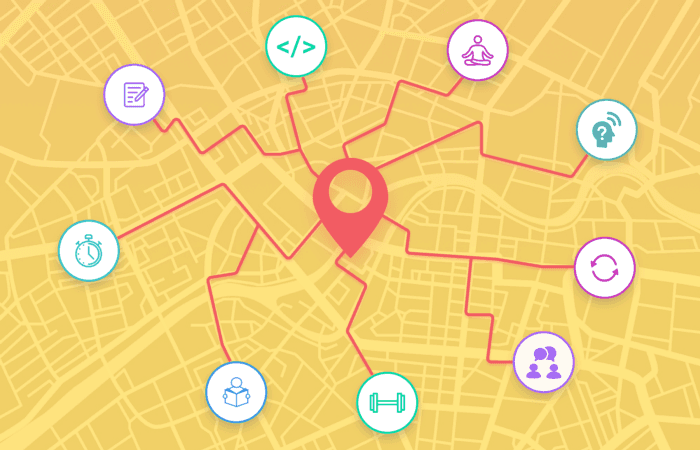I’ve seen hundreds of junior frontend developers' resumes. In an average recruitment process, we get 80 candidates for one job.
What makes us pick you?
The sad truth is you have to stand out. If there’s nothing special about your skills or experience, you have to be lucky to get a job. And relying on luck is not a reliable tactic.
Fortunately, it’s not that hard to stand out. Most of the resumes are like carbon copies. The candidates finished the same bootcamps or online courses. They have similar projects. Sometimes, even their portfolio pages are indistinguishable.
Here are a few ideas to put you ahead of the competition.
1. Blog
Blogging has so many benefits for junior developers. Above all, writing is amongst the best ways of learning. To explain a topic, you have to deep-dive into it and structure your mental models.
When you start to write a blog post, you discover hidden layers of complexity everywhere—the things you took for granted suddenly become questionable.
Even simple things, like paddings and margins in CSS, have some complexities and edge cases. By the time you finish the article, you’ll grasp the subject much better.
What’s even better, your blog is proof of your progress. If you’ve been blogging regularly for months, your future employer can see programming is not a temporary whim but something you take seriously. That’s a great indicator you’re someone worth working with.
The next advantage of having a blog is the chance to create a network. If your blog becomes popular, you’ve got the unique ability to meet other people or even help them. It’s not only fun but can also help you get noticed and find a job by referral.
Not starting a blog when I was a junior developer is my greatest regret. I could have accelerated my education and helped others.
2. Seek a Job Actively
How do you look for a job?
Suppose you’re like almost everyone — you find postings on job boards and apply to the companies when you more or less meet the requirements. That’s fine. But there’s one problem: Thousands of other people are doing the same.
It’s hard to find a job when you’re doing the same as everyone else.
What’s a better way?
Apply to the companies you like. Many smaller companies need more employees but don’t want to go through the hassle of the recruitment process. So help them.
Research companies you’d like to work with and send them an email. Just a short message about how you admire what they do and would love to be a part of the team. Chances are you’ll get an answer, and if you’re lucky, you may even get a job.
Being proactive is so advantageous because you cut through the noise. You don’t need to compete with dozens of developers. You just need to convince a company you’ll bring value.
What’s more, by being proactive, you show your future employer you’re resourceful, care about the company, and appreciate its products.

3. Freelance
Freelancing is not for everybody. Especially at the beginning of your career, working for a company and having a mentor is usually a better bet.
But… a little freelancing is a great way to get relevant experience. Looking for work on Fiverr or Upwork can be underwhelming because the competition is huge and prices are low. Yet when you eventually find a client, you get many benefits.
Even a cheap project is better than a free project. And all your learning projects are free. So creating an app for a small salary is a bit like finding someone willing to pay for your learning. Sounds good, doesn’t it?
Additionally, freelancing clients can pay you with something more valuable than money — testimonials. Having real and satisfied clients on your portfolio page is a huge boost to your job-seeking chances.
And if you are fortunate, one of your freelancing customers can offer you a job. Isn’t that great?
4. Contribute to Open Source Projects
You may have heard that contributing to open source is great to improve your programming skills. It is. It’s also a great sign for your future employer — it shows that you’re active in the programming community, can use version control, and understand the software creation process.
The best part?
No one is doing it. In the hundreds of junior developer resumes I’ve seen, maybe a handful of candidates were contributing to open source. And guess what? They got invited to a technical interview.
I know open source seems scary to junior developers. You may have many doubts. How can you provide any value? Where do you start? Will they judge you? Don’t worry, the programming world is friendly and always happy to help beginners.
To help you get started, take a look at this GitHub repository. It includes many tips on how to start and a list of beginner-friendly projects. This guide will smooth your transition to the open source world.
5. Write Tests
Writing good code will make your job search easier. What is good code? Code that does its job, is readable, maintainable, and follows good conventions like DRY (Don’t Repeat Yourself) and KISS (Keep It Simple, Stupid).
But there’s one problem.
When you’re a beginner, you don’t know if your code is any good. The ability to recognize solid code is something that comes with experience. You don’t have experience, so you don’t know. You can’t get experience because you don’t have a job—it’s a vicious circle.
Luckily, I’ve got a shortcut to show your future employer you know what you’re doing: Write tests for your code.
Tests are great. They show that you care about quality. Junior developers rarely include them, so you can stand out. They are proof you’re able to do some extra work.
Tests make me want to hire you.
You may not know if your code is good, but you’ll know if it is tested. And tested code is always better.
Conclusion
How about you? What are your strategies when looking for a job? Or maybe you already got a job and want to share your experience.






